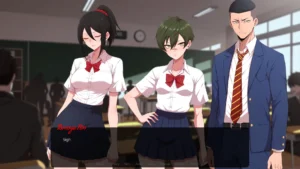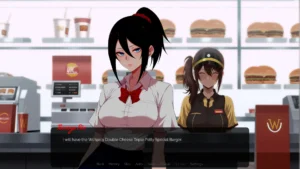
Aperture
Play Aperture
Aperture review
Unraveling the Mysteries of ‘Aperture’
In the realm of interactive storytelling, ‘Aperture’ stands out as a visual novel that delves into themes of slow corruption and emotional drama. This game, available on multiple platforms, promises a gripping narrative that explores the gradual fall of its protagonist, Rin. Let’s dive into what makes ‘Aperture’ unique and how it engages players with its mature content.
Understanding ‘Aperture’
What is ‘Aperture’? 🎭
If you’re like me, you’ve probably spent countless evenings getting lost in stories where your choices actually matter. That’s the magic of the visual novel genre, and it’s exactly where the Aperture game shines. I remember firing it up for the first time, expecting a neat little story, and instead finding myself completely captivated by its unique atmosphere. So, what exactly is this experience that’s been quietly gathering a dedicated following?
At its heart, the Aperture game is a narrative-driven visual novel that masterfully weaves together personal relationships with a deeply unsettling slow corruption theme. You don’t just watch the story unfold; you live it through the eyes of the protagonist, making decisions that feel small at the moment but have rippling consequences. It’s not about jump scares or overt horror; the tension builds in the quiet moments, in the slight changes in a character’s dialogue, or the gradually shifting background art. This isn’t a game you simply play—it’s one you feel. The emotional drama isn’t just a tagline; it’s the very fabric of the experience, pulling you into a world where trust is fragile and reality is subjective.
Gameplay Mechanics and Themes 🎮
The genius of this visual novel lies in its deceptively simple mechanics. You read, you click, you choose. But oh, those choices carry so much weight. I made what I thought was an innocent, encouraging comment to one character in Chapter 2, only to have it come back in a devastating way three chapters later. The game tracks your relationships, your moral compass, and even your subtle biases, feeding them all back into the narrative.
The core of the gameplay is this interconnected system of player choices. It’s not about picking a “good” or “evil” path. It’s about navigating complex human interactions, and every dialogue option nudge the story in a unique direction. This system is perfectly married to the game’s central slow corruption theme. The corruption isn’t of a place, but of people, relationships, and your own perception of events. You start with a clear goal and seemingly stable friendships, but as you progress, doubt begins to creep in. Who can you trust? Are your memories reliable? The game makes you question your own judgment, which is a far more powerful tool than any monster.
Here’s a quick look at how your choices can shape the experience:
| Choice Type | Immediate Impact | Long-Term Consequence |
|---|---|---|
| Supporting a Friend | They thank you; relationship meter increases. | They may become dependent on you, leading to a dramatic confrontation later. |
| Seeking the Truth | You uncover a hidden piece of information. | This knowledge isolates you from others, altering available story paths. |
| Ignoring a Problem | Avoids immediate conflict or stress. | The unresolved issue festers, causing a much larger, unavoidable crisis. |
This careful layering of cause and effect is what fuels the intense emotional drama. You’re not just a spectator to the characters’ pain, joy, and fear; you are an active participant, and often, the catalyst.
Player Reception and Expectations 👥
The player reception for the Aperture game has been fascinating to watch. It hasn’t exploded onto the mainstream scene with a massive marketing blitz. Instead, it has grown organically, building a community of players who are deeply invested in its world and characters. In online forums and review sections, you consistently see praise for its writing and its brave commitment to its slow corruption theme. People aren’t just playing it; they’re dissecting it, sharing their unique story outcomes, and theorizing about what comes next.
Many players, myself included, went in expecting a standard romance or mystery visual novel and were completely disarmed by the psychological depth. The game demands emotional investment and rewards you with a story that feels uniquely yours. This has naturally led to very high expectations for future chapters. The community is buzzing with questions. Will our saved choices carry over? How many different endings are truly possible? The developers have created a narrative framework with immense potential, and the audience is eagerly waiting to see how far it can go.
“I started playing Aperture expecting a nice story, and now I’m emotionally invested in fictional people to an unhealthy degree. Every choice feels like I’m holding a beating heart. 10/10.” – A player review on Steam.
This sentiment really captures the essence of the player reception. It’s a game that resonates on a personal level, making you care deeply about the consequences of your actions. The future of this Aperture game looks incredibly bright, and if the current emotional drama and intricate storytelling are any indication, we are in for an unforgettable journey. The community is ready, the foundation is rock-solid, and the anticipation for what’s next is palpable.
In conclusion, ‘Aperture’ offers a unique blend of storytelling and interactive elements, making it a compelling experience for fans of visual novels. With its mature themes and engaging narrative, it’s clear why players are eagerly awaiting future chapters. If you’re interested in exploring complex characters and emotional drama, ‘Aperture’ is certainly worth checking out.
















